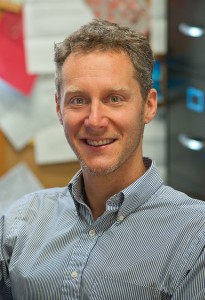WASHINGTON — Recognized for his work in evolutionary robotics, University of Vermont researcher Joshua Bongard was honored with the highest award given by the U.S. government to young scientists, the second faculty member in UVM history to win the award.
President Barack Obama named Bongard among 94 people to win the Presidential Early Career Award for Scientists and Engineers on Monday. The award comes with $500,000 to support Bongard’s research over the next several years.

Vermont researcher Joshua Bongard is one of 94 winners of the Presidential Early Career Award for Scientists and Engineers this year. Photo by Sally McCay, University of Vermont
“I feel greatly honored to receive this award and also heartened that we have leadership in Washington that supports basic research,” Bongard said in a telephone interview. “Scientific discoveries not only create new technology and new jobs, but also inspire us all. Humans always were — and still are — explorers.”
Bongard, 37, grew up in Toronto but now lives in Jericho, Vt., with his wife, Jessica.
While this is the highest award he has received, Bongard is no stranger to national recognition.
In 2007, shortly after he joined the faculty at UVM, Bongard was awarded the Microsoft New Faculty Fellowship. The same year, MIT Technology Review named him one of its “Top 35 Innovators Under 35.”
Bongard has understood the possibilities of computer science since he was a teenager.
“My parents bought me my first computer when I was 13, and I quickly learned that, with enough hard work, you could get a computer to do anything,” Bongard said.
Now, he uses computers to run genetic algorithms, which simulate evolution in robots to automatically become better and more efficient over time.
Longtime friend Mike Brock said that every time he tries to explain Bongard’s research, his answer changes depending on the detail needed.
“He’s trying to see how robots teach themselves, and adapt their capabilities and even their physical makeup to do new things,” Brock said is the clearest response. “It has great potential to further development in numerous fields, like space exploration and medicine.”
When Bongard first discovered the field, “it seemed like magic to me, and to this day, still does,” he said.
His research over the past several years “grew out of an interest in ‘embodiment’ — the idea that intelligence always requires a body,” said Bongard’s former Ph.D. adviser, Rolf Pfeifer, who is now director of the Artificial Intelligence Laboratory at the University of Zurich in Switzerland. “So if you want to evolve creatures, you have to evolve the body and the brain at the same time. Josh is a pioneer in this field.”
Bongard’s discipline is a mix of computer science, mechanical engineering and biology. Evolutionary roboticists must have strong interest and skill in all three areas.
“He sees things that other people haven’t and has this unique blend of interest that allows him to go places other people haven’t seen or aren’t aware of,” said Hod Lipson, an associate professor at Cornell University, where Bongard did his postdoctoral research.
Brock said Bongard has always been interested in trying new things and pushing the limits of what he can do.
“He loves what he does, and he’s really passionate about learning it and sharing it with everybody,” Brock said. “He’s exploring the boundaries of what we know about how things evolve and how we can make things better.”
Bongard will be in Washington Oct. 13-14 to receive the award and attend a recognition ceremony at the White House.
“The PECASE award will allow my students and I to further explore how evolution can be simulated in a computer and used to evolve smarter robots,” Bongard said.
He also will use the funds to develop a website that will allow anybody to practice their own simulated robotics experiments online.
“The benefit for the user is that they can learn, hands-on, about evolution, neuroscience and robotics,” he said. “The benefit for us is that we have more people contributing to the discovery process.”
